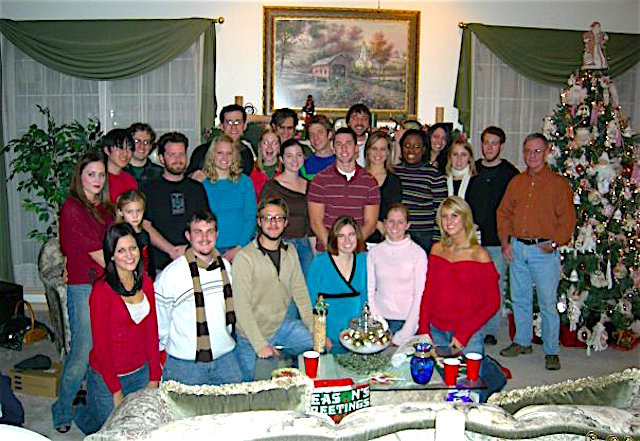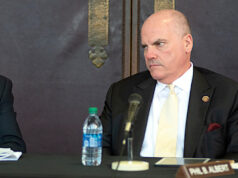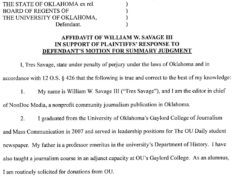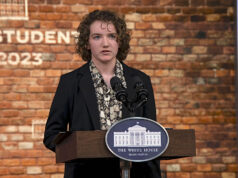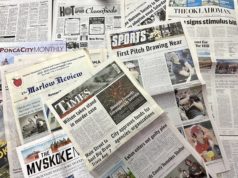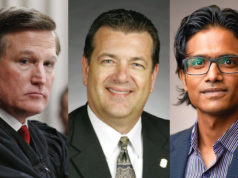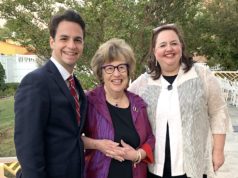
The University of Oklahoma’s student newspaper has turned 100 this year, and buried on the back of a sparse weekend special section celebrating a century of independent student journalism were two columns from important voices.
Andy Rieger and Jack Willis each served as The Oklahoma Daily’s editorial adviser for different spells, and the pair also represents the two most influential journalists responsible for shaping NonDoc by proxy — Josh McBee and I worked under both Rieger and Willis.
Unfortunately, neither the column Willis wrote nor the piece Rieger penned initially appeared on OUDaily.com, an awkward oversight for a publication that dropped its print publication from five days a week to just two last spring. (The pieces were added this morning after this commentary originally published, and they can be found here and here.)
Perhaps I can offer my own recollections of the important lessons and amusing anecdotes Rieger and Willis offered over the years.
A phone call never to be forgotten
Andy “Two-Ply” Rieger served as editor of The Oklahoma Daily and then its adviser before becoming editor of The Norman Transcript. While he has retired from that position, he still writes his Sunday column in The Tranny, which often recalls a slower, smaller Norman before the internet and urban sprawl.
Rieger once informed NonDoc managing editor Josh McBee that his collegiate nickname became “Two-Ply” because he successfully advocated for better toilet paper at his fraternity, an act worthy of adulation.
McBee served as The Transcript’s entertainment editor for a few years, and on Sundays he and I were chiefly responsible for laying out Monday’s paper. I had known Rieger’s son, Patrick, through school, and I took an internship at the paper straight out of high school. Eventually, I earned my first journalism paycheck by working nights in the newsroom and being responsible for proofreading, sandwich runs and making sure sports editor Clay Horning got the date right. Over that period of time, Rieger assigned me interesting stories, taught me how to pitch my own, let me sit in on editorial board meetings and allowed me to take the bumps and bruises that any good journalist accumulates along the way.
Once, I had heard of a tractor accident on the police scanner. I responded, took pictures and wrote a story. When we published a photo of the upside-down tractor on the next day’s front page, a family member of the man crushed to death underneath spent an hour yelling at me on the phone until her anger turned to tears. Rieger had insisted I take the call myself, and the event taught many lessons, including an important one: Just because we can run something doesn’t mean we should.
Highs and lows at The Daily
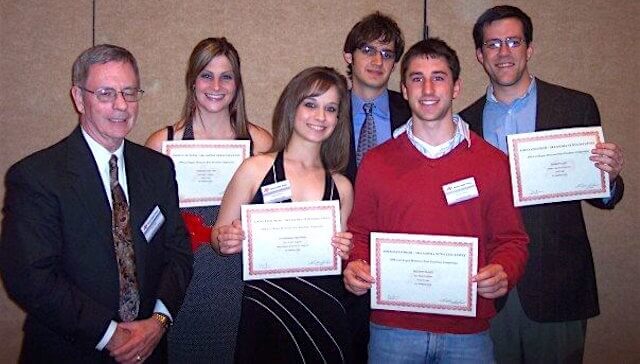
The next semester, I became the student paper’s managing editor, and Jack’s guidance helped me understand what it meant to be professional in a leadership role. I eventually began to grasp why he allowed the students he mentored to make mistakes and discuss big decisions themselves, even though he could have stepped in more often and earlier.
Jack was diagnosed with breast cancer at some point during that year, and I remember not wanting to discuss it with him. I just wanted to sit in his office and hear tales from his time in Muskogee; hear advice on how to interact with OU President David L. Boren; laugh as he became more frank and sarcastic about the university, powers that be and a political climate that seemed to confound him. I, like everyone, was worried we might lose him.
When the Student Media publications board voted to make me the 2006-2007 editor in chief, I didn’t know I would be the last editor Jack mentored before retiring. At the same time, McBee was heading to OU for journalism graduate school, and I recruited him to serve as our night editor. He laid out the paper in Copeland Hall, across the street from a Gaylord College of Journalism and Mass Communication that didn’t teach anybody how to do so. Jack and his outstanding markups made sure that McBee and I knew we didn’t know everything. He pushed us constantly.
That year, I stressed Jack out more than I’d like to admit. We taped condoms to the front page for the second consecutive year — which he supported — and I appeared before the publications board twice in criticism: once for my non-Daily-affiliated, fictional Jim Lemons campaign, and once for writing a blunt and amusing email to a Chinese exchange student who was calling me and now-Tulsa World reporter Jarrel Wade racists. We had fired him for reasons of ethics, insubordination and lying, and the pub board ultimately could do nothing but endure a lot of rhetoric from the student. Regarding Mr. Lemons, members also concluded that the board did not have the authority to violate my First Amendment right to print absurd political signs and stick them in my yard.
After organizing and hosting a successful debate between Norman mayoral candidates, I eventually ended my editorship with an editorial critiquing the Gaylord College for various shortcomings and its virtually nonexistent relationship with the student paper. I missed my mark (slightly) with the piece’s tone and caused a kerfuffle that made me sick to my stomach. Jack was mad, among many others. Ironically, rumors spread that Boren had called me into his office and lambasted me for hours. In truth, we had spoken in the Dale Hall parking lot, and he expressed a desire to improve on some of the concerns I had highlighted.
The entire event proved to be yet another lesson that would shape me for years to come. Whenever I face adversity, I try to remember that it can’t be as stressful as having an entire college’s worth of professors mad at me.
Many NonDoc voices are Daily alumni
Now, 10 years later, we live in a different journalistic climate where much has changed. Fortunately, The Daily remains a professional place for journalism leaders of tomorrow to cut their teeth and learn lessons like the ones listed above.
Here at NonDoc, we wouldn’t be who or where we are without the opportunities afforded by The Daily or the guidance given by some of its most important people along the way.
Of the voices you read on our site now, remember that Ashiq Zaman, Tiara Blue, Mike Allen, James Nghiem, Danny Marroquin, Jeremy Cowen, Meredith Simons, Doug Serven, Lindsay Hodges Anderson, Mark Potts, George Lang, Nicole Hill, Spencer Livingston Gainey, Stephen Martin and more cut their teeth at an independent, student-run news organization that has shaped decades worth of important journalists.
Now, if you’ll excuse me, I’ve got to try to find a way to epoxy condoms to the front of NonDoc.
Thanks for all the help, Jack and Andy.
(Editor’s note: This post was updated at 10 a.m., Monday, Oct. 17, to include the now-posted columns on OUDaily.com.)









